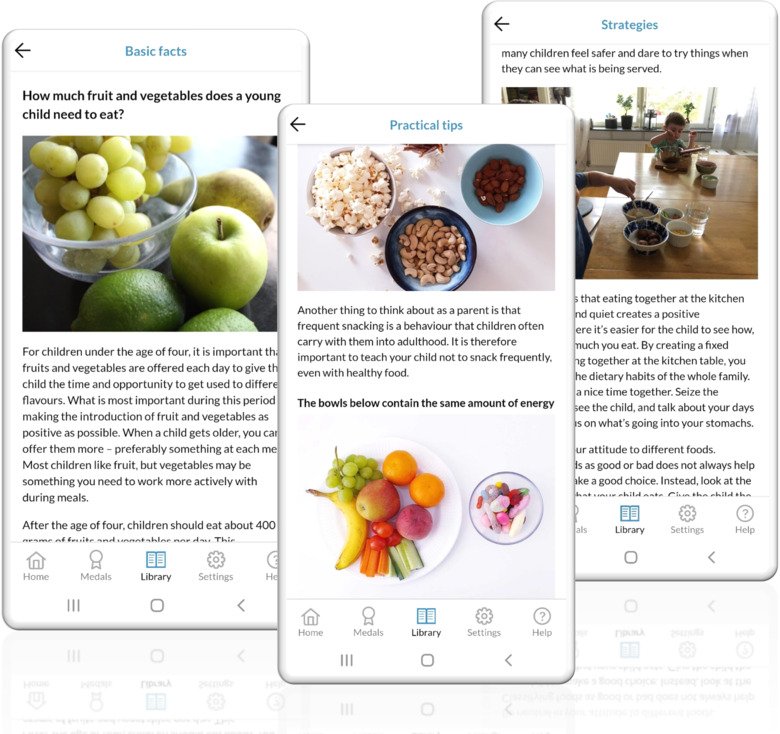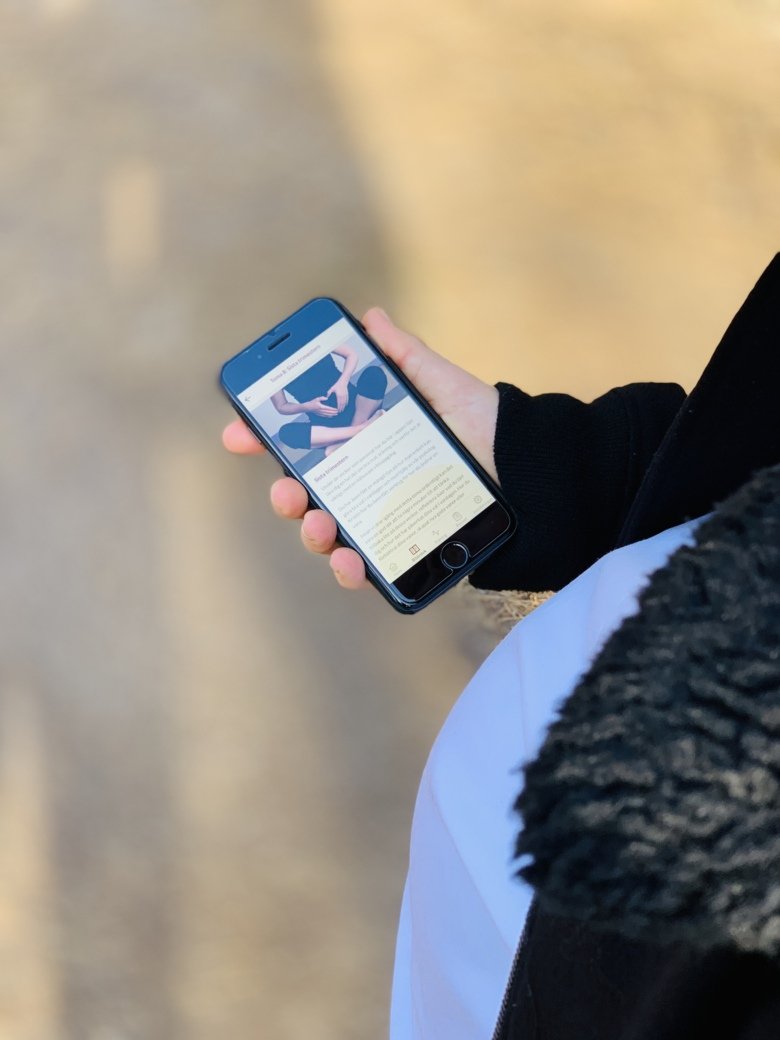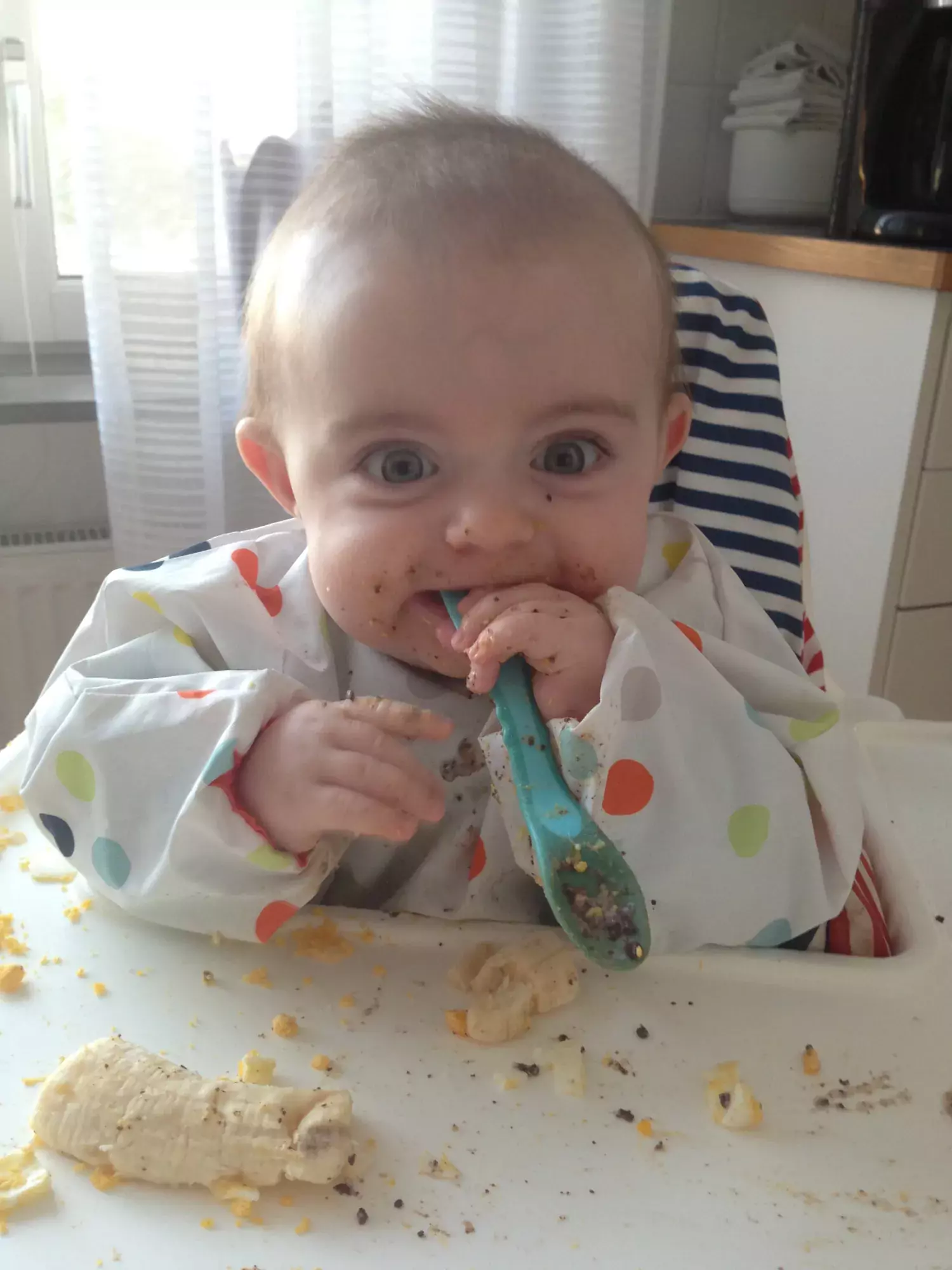Mobile based interventions to promote a healthy lifestyle in preschool aged children and pregnant women
The use of mobile technology, referred to as ‘Mobile Health’ or mHealth, is becoming popular to assist, inform and guide people to a healthy lifestyle and is used for primary and secondary disease prevention. We utilise mHealth to develop new methods for dietary and physical activity assessments as well as to deliver lifestyle interventions. Here we present some of our research intervention projects.
Mobile-based Intervention Intended to Stop Obesity in Preschoolers (MINISTOP)
To support parents and counteract overweight and obesity in preschool children with the help of a mobile application.
Childhood overweight and obesity is a global health problem. Traditional obesity prevention programs are time and cost intensive. The use of mobile phone technology (mHealth) through smartphone applications (apps) to deliver such interventions has recently attracted interest. MINISTOP is a mobile health app designed to support parents of preschool-aged children in improving dietary and physical activity habits as well as to reduce the prevalence of overweight and obesity in children.
The MINISTOP 1.0 trial investigated the effectiveness of a 6-month mHealth parental intervention on body composition, dietary habits, and physical activity in a population-based sample of 4-year-old children. The intervention group (MINISTOP app) compared to the control group significantly improved their composite score including body composition, dietary, and physical activity variables compared to the control group. Furthermore, MINISTOP was well accepted by participating parents.

The MINISTOP 2.0 trial is a type I implementation-effectiveness trial currently evaluating the MINISTOP app (now available in Swedish, English, Arabic and Somali) within primary child healthcare center, focusing on effectiveness. The outcomes of interest are: key dietary indicators, physical activity, screen time, BMI, and parental self-efficacy. Furthermore, the implementation of MINISTOP with regards to perceived acceptability, appropriateness, and feasibility among parents and child healthcare nurses has been investigated. Data collection was finalized in September 2021 (n = 552) and the analyzes showed that the intervention group had lower intakes of sweet and savory treats, sweet drinks, and less screen time at follow-up compared to the control group. Parents that used the MINISTOP app also reported higher self-efficacy for promoting healthy lifestyle behaviors. See link to publication below. Contact person: Christina Alexandrou (PhD student).
We have now been working with updating and improving the app further, based on parents' feedback during the trial process, and the intervention will now be implemented on a larger scale in Swedish primary child healthcare.
The MINISTOP 3.0 trial is a type III hybrid implementation-effectiveness trial focusing on the large-scale implementation as well as real-world effectiveness and cost-effectiveness of MINISTOP. Data collection for this project is ongoing and will finish in March 2026. Contact person: Christine Delisle Nyström (assistant professor).
Funding: MINISTOP 1.0: Swedish Research Council, Swedish Research Council for Health, Working Life and Welfare; Bo and Vera Axson Johnsons Foundation; and Karolinska Institutet. MINISTOP 2.0: Swedish Research Council for Health, Working Life, and Welfare; Region Östergötland; and Strategic Research Area in Health Care Science. MINISTOP 3.0: the Swedish Cancer Society.
Selected publications - MINISTOP
Effectiveness of a Smartphone App (MINISTOP 2.0) integrated in primary child health care to promote healthy diet and physical activity behaviors and prevent obesity in preschool-aged children: randomized controlled trial.
Alexandrou C, Henriksson H, Henström M, Henriksson P, Delisle Nyström C, Bendtsen M, Löf M
Int J Behav Nutr Phys Act 2023 Feb;20(1):22
Mobile-based intervention intended to stop obesity in preschool-aged children: the MINISTOP randomized controlled trial.
Nyström CD, Sandin S, Henriksson P, Henriksson H, Trolle-Lagerros Y, Larsson C, Maddison R, Ortega FB, Pomeroy J, Ruiz JR, Silfvernagel K, Timpka T, Löf M
Am J Clin Nutr 2017 06;105(6):1327-1335
MINISTOP 2.0: a smartphone app integrated in primary child health care to promote healthy diet and physical activity behaviours and prevent obesity in preschool-aged children: protocol for a hybrid design effectiveness-implementation study.
Henriksson H, Alexandrou C, Henriksson P, Henström M, Bendtsen M, Thomas K, Müssener U, Nilsen P, Löf M
BMC Public Health 2020 Nov;20(1):1756
Adapting a Parental Support App to Promote Healthy Diet and Physical Activity Behaviors (MINISTOP) for a Multi-Ethnic Setting: A Qualitative Study on the Needs and Preferences of Parents and Nurses within Swedish Child Health Care.
Alexandrou C, Müssener U, Thomas K, Henriksson H, Löf M
Nutrients 2021 Jun;13(7):2190

MINISTOP plus program
MINISTOP has been developed to be a comprehensive digital support program for all children irrespective of weight status. However, a one size fits all approach may not be sufficient for all families as some may require additional support through in-person activities to achieve the required lifestyle behaviour change in order for children to attain and maintain a healthy weight. For the past 11 years the municipality of Kungsbacka has a Community Group, which is free of charge for children aged 5-19 years with overweight and obesity. In 2021, the municipality of Kungsbacka has recently initiated a pilot project, the Community Group MINI which is targeting children aged 3-5 years with overweight and obesity. Thus, this pilot randomized controlled trial aims to evaluate the efficacy and feasibility of the MINISTOP plus program in pre-school children with overweight and obesity on: (i) children’s BMI z-scores; (ii) key dietary indicators; (iii) physical activity; and (iv) screen time. Data collection for this trial will be initiated in September 2022. Contact person: Christine Delisle Nyström

HealthyMoms
An app to promote healthy weight gain, diet and physical activity during pregnancy
In this study we have built on the concept of the MINISTOP app and modified it for pregnant women. The primary outcome is gestational weight gain while the secondary ones are dietary intake and physical activity. The intervention group receives the app in gestational week 14 and receives a 6-month intervention program until gestational week 37. Data collection was finalized in the autumn of 2020 (n=305 women). The results showed that women in the intervention group had a healthier diet and that women with overweight and obesity gained less weight than the control group. The next step is to implement the app into routine care. Contact persons: Emmie Söderström and Johanna Sandborg (PhD students).
Funding: the Swedish Research Council; the Swedish Research Council for Health, Working Life and Welfare; Bo and Vera Axson Johnsons Foundation, Karolinska Institutet.
Selected publications - HealthyMoms
A Smartphone App to Promote Healthy Weight Gain, Diet, and Physical Activity During Pregnancy (HealthyMoms): Protocol for a Randomized Controlled Trial.
Henriksson P, Sandborg J, Blomberg M, Alexandrou C, Maddison R, Silfvernagel K, Henriksson H, Leppänen MH, Migueles JH, Widman L, Thomas K, Trolle Lagerros Y, Löf M
JMIR Res Protoc 2019 Mar;8(3):e13011
Effectiveness of a Smartphone App to Promote Healthy Weight Gain, Diet, and Physical Activity During Pregnancy (HealthyMoms): Randomized Controlled Trial.
Sandborg J, Söderström E, Henriksson P, Bendtsen M, Henström M, Leppänen MH, Maddison R, Migueles JH, Blomberg M, Löf M
JMIR Mhealth Uhealth 2021 03;9(3):e26091
Participants' Engagement and Satisfaction With a Smartphone App Intended to Support Healthy Weight Gain, Diet, and Physical Activity During Pregnancy: Qualitative Study Within the HealthyMoms Trial.
Sandborg J, Henriksson P, Larsen E, Lindqvist AK, Rutberg S, Söderström E, Maddison R, Löf M
JMIR Mhealth Uhealth 2021 03;9(3):e26159

INFANT-Swe
Infant feeding and active play - support to parents
Group member Dr Christine Delisle Nyström has an ongoing collaboration with researchers at the Deakin University who have developed The Infant, Feeding, Activity, and Nutrition Trial (INFANT). This is a program for parents of infants 0-2 years of age, to help support healthy eating and active play from the start of life. The program consists of face-to-face group sessions with parents and caregivers, supported by a program-specific app (My Baby Now) as well as a website. In Sweden, there has been a lack of interventions starting in infancy, thus, this collaboration aims to understand how INFANT can be adapted to fit in a Swedish context. As part of this work we have also conducted qualitative interview studies of Swedish parents and child health care nurses in Sweden to better understand their needs (see references in list below). Contact person: Christine Delisle Nyström.
Funding: Swedish Research Council for Health, Working Life and Welfare.
Selected publications - INFANT-Swe
The Need for an Evidence-Based Program in Sweden to Support Parents to Create Healthy Lifestyle Behaviors from the Start of Life-Parental Perceptions.
Henström M, Müssener U, Campbell KJ, Hesketh KD, Rosell M, Delisle Nyström C
Nutrients 2020 Dec;12(12):3823
How to Support Child Healthcare Nurses in Sweden to Promote Healthy Lifestyle Behaviors from the Start of Life.
Ersson M, Henström M, Almquist-Tangen G, Hesketh KD, Delisle Nyström C
Children (Basel) 2021 Aug;8(8):696

PICNIC Sweden - Child feeding peer support on social media
Australian child nutrition and feeding program supporting parents through social media and peer-education
Developed in Australia, the 'Parents In Child Nutrition Informing Community' (PICNIC) program is an innovative peer-education program which aims to promote the development of healthy eating behaviours in children. PICNIC support parents in their first years of parenthood by facilitating peer-to-peer sharing of evidence-based child nutrition and feeding information, and by reaching the parents 'where they are'; that is, online and on social media. Parents are trained in Dietitian-led workshops and then supported with evidence-based child nutrition and feeding information through social media (Facebook/Instagram) and a project-specific website.
The research team behind PICNIC in Australia consist of Accredited Practicing Dietitians at the Mid North Coast Local Health District and researchers at the University of Newcaste, New South Wales, including Richard Ball (PI), Rachel Gerathy, Prof Clare Collins, Dr Kerith Duncanson, Dr Tracy Burrows, Dr Andrew Bailey, Teisha Schirmer and others. Since 2020 we have built a strong collaboration, sharing experiences and expertise, with the overall goal of eventually bringing PICNIC to parents in Sweden.
"PICNIC Sweden" - a pilot study for parents in Sweden!
In 2023 we received a project grant from the Henning & Johan Throne-Holst Foundation to invite parents/carers of children 0-2 years of age to take part in the PICNIC program and then provide us with feedback to help tailor it to a Swedish context. Participants were recruited during 7 weeks in Oct-Nov 2023. Almost fifty parents attended an online child feeding workshop with experienced Registered Dietitian Sara Ask (in Swedish), and were then supported with further information via social media and the Australian PICNIC website. They also had the opportunity to post questions which were answered in the project-specific Facebook group. The pilot project is evaluated using online surveys and interviews. The results have been analysed and will be submitted for publication soon. Overall the parents were very positive to the PICNIC model, and expressed that they felt more confident around child feeding after participating in the project.
Project leader: Maria Henström
Selected publications - PICNIC
Online reach and engagement of a child nutrition peer-education program (PICNIC): insights from social media and web analytics.
Henström M, Duncanson K, Collins CE, Ashton LM, Davidson E, Ball R
BMC Public Health 2022 04;22(1):836
In this study, we explored web and social media analytics data to get insights into PICNIC program reach and engagement amongst Australian parents online.
Engaging New Parents in the Development of a Peer Nutrition Education Model Using Participatory Action Research.
Ball R, Duncanson K, Ashton L, Bailey A, Burrows TL, Whiteford G, Henström M, Gerathy R, Walton A, Wehlow J, Collins CE
Int J Environ Res Public Health 2021 12;19(1):102
This paper describes how the PICNIC program has been developed over time and been shaped by the parents themselves through Participatory Action Research, i.e., co-creation with the target group.

Saga Stories ("SagaSagor") in health talks
'Saga Stories in health talks' (swe SagaSagor i Hälsosamtal) consists of material for child healthcare nurses to use to facilitate health talks with both the child and parent(s) at the routine 5-year visit at primary child healthcare. Using a type I hybrid implementation-effectiveness trial in 40 CHC centres, we aimed to evaluate the effectiveness of 'Saga Stories in health talks' on parental self-efficacy, and children’s intake of key dietary indicators, and screen time, as well as to evaluate and explore implementation aspects. CHC nurses in the intervention arm found the material to be a valuable working tool for their health talks with 5-year-olds (qualitative results from interviews have been submitted for publication). However, the trial data showed no statistically significant intervention effect on parents’ self-efficacy or children’s health-related behaviours as reported by their parents (see paper below). The trial was funded by the Swedish Cancer Society. Contact persons: Christine Delisle Nyström and Maria Henström Engblom.
Selected publications - 'SagaSagor in health talks'
Study protocol for an effectiveness-implementation hybrid trial to evaluate a health promotion intervention in parents and their 5-year-old child: Saga Stories in health talks in Swedish child healthcare.
Delisle Nyström C, Henström M, Andermo S, Almquist-Tangen G, Thomas K, Löf M
BMC Public Health 2022;22:2184
'Saga Stories in health talks' for health promotion in Swedish child healthcare: results from a cluster-randomised hybrid type 1 effectiveness-implementation study.
Henström M, Delisle Nyström C, Andermo S, Thomas K, Löf M
BMC Public Health 2025;25:1637

Active transport interventions
Promote physical activity in adults through active transportation
Physical inactivity is a global health concern. The IMPACT group is therefore also working with projects aimed at increasing physical activity levels in the general population.
The Smart City Active Mobile Phone Intervention (SCAMPI) Study was a randomized controlled trial where we evaluated whether a behavior change program delivered via a smartphone app (the TRavelVU Plus app) could motivate participants to increase their physical activity by engaging in active transportation (for instance walk or bike to work instead of taking the car or buss). Main findings include that we observed an increase in moderate-to-vigorous physically activity (MVPA) which corresponded to approximately 30 % of the weekly MVPA recommendation. We now build on these findings in the new project Active Travel (funded by Vinnova 2021-2023, co-applicant Marie Löf).
We are also the leader of one of the work packages (for evaluation) for the project Bikable City which is an initiative by Trivector with the overall aim to increase everyday physical activity through active transportation in the general population in Sweden. It is an ongoing collaborative project funded by Vinnova (second stage) and involving 17 organisations from e.g., academia, industry and regions. Read more on the Bikable City website. Contact person: Matilda Ersson (research assistant).
Selected Publications -Active transport
The Smart City Active Mobile Phone Intervention (SCAMPI) study to promote physical activity through active transportation in healthy adults: a study protocol for a randomised controlled trial.
Ek A, Alexandrou C, Delisle Nyström C, Direito A, Eriksson U, Hammar U, Henriksson P, Maddison R, Trolle Lagerros Y, Löf M
BMC Public Health 2018 07;18(1):880
Effectiveness of a 3-Month Mobile Phone-Based Behavior Change Program on Active Transportation and Physical Activity in Adults: Randomized Controlled Trial.
Ek A, Alexandrou C, Söderström E, Bergman P, Delisle Nyström C, Direito A, Eriksson U, Henriksson P, Maddison R, Trolle Lagerros Y, Bendtsen M, Löf M
JMIR Mhealth Uhealth 2020 06;8(6):e18531
Research programs
MoBILE - mHealth for multiple lifestyle behaviours
The Mobile Health Multiple Lifestyle Behavior Interventions Across the Lifespan (MoBILE) research program is a collaborative initiative supported by Forte (29.8 million SEK, 2019-2024, PI: Marie Löf, co-coordinator Marcus Bendtsen). The aim with MoBILE is to develop and evaluate mHealth lifestyle interventions for various target groups (children, young adults, pregnant women and elective surgery patients) to be implemented and delivered via the healthcare sector. We are conducting seven randomized controlled trials and the program supports four PhD students. Contact person: Prof Marie Löf.
Selected publications - protocol for the MoBILE research program
The Mobile Health Multiple Lifestyle Behavior Interventions Across the Lifespan (MoBILE) Research Program: Protocol for Development, Evaluation, and Implementation.
Bendtsen M, Bendtsen P, Henriksson H, Henriksson P, Müssener U, Thomas K, Löf M
JMIR Res Protoc 2020 Apr;9(4):e14894
SPARK
Smart phone app to improve self-management of gestational diabetes
The SPARK project (Smart Phone App for gestational diabetes patients suppoRting Key lifestyle behaviors and glucose control) is a new mHealth project which will provide support to patients with gestational diabetes through an app during 2022-2024. The support will consist of healthy eating and physical activity advice, as well as glycaemic control through daily monitoring of blood glucose levels. Also, a health care provider will be able to monitor and provide feedback on the patients' blood glucose levels through a specific platform interface. Approximately 400 women will be included in the study. The SPARK project is led by Marie löf at KI, with close collaboration with researchers and clinicians at Linköping University and Region Östergötland in Sweden. Contact persons: Prof Marie Löf, Emmie Söderström and Matilda Ersson.
Funding: Swedish Research Council, Diabetesfonden, Strategic Research Area Health Care Science (SFO-V), Karolinska Institutet, FORSS.
